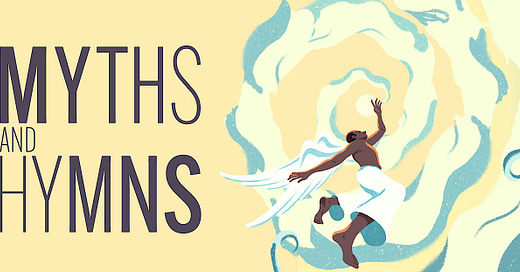The return of Myths and Hymns has delightedly caught me by surprise. Our awful pandemic moment does yield unexpected confluences on occasion. The past suddenly looms up to pierce the present gloom and point hopefully towards the future.
Myths and Hymns first appeared in the 1990s as a transcendent cycle of songs by composer Adam Guettel derived from ancient Greek mythology and an old 19th-Century Protestant hymnal Guettel had found in a used bookstore. The piece received a production in 1998 at the Public Theater under a different title, Saturn Returns, and a stellar Nonesuch recording was also cut using the original moniker.
Now Myths and Hymns is about to be reborn, beginning January 13, in a tremendously ambitious digital re-imagining by the esteemed conductor and musical director (and old pal of mine) Ted Sperling, with his marvelous music-theater entity, MasterVoices. The entire cycle will be presented in four parts online over the next six months, performed by an astonishing roster of singers, including Julia Bullock, Renée Fleming, Joshua Henry, Cheyenne Jackson, Capathia Jenkins, Mykal Kilgore, Norm Lewis, Jose Llana, Kelli O'Hara, and Elizabeth Stanley. Twenty-three short musical films have been created for the work by directors Greg Anderson, Sammi Cannold, Lear deBessonet, Khristian Dentley and by Mr. Sperling himself, in collaborations with visual artists Yazmany Arboleda, Cloud Chatanda, Steven Kellogg, Lucy Mackinnon, and Danny Mefford.
I loved Myths and Hymns and wrote about it in the original Ever After. Adam Guettel, in fact, remains one of the book’s heroes, spotlit with his own chapter the first time around (it now appears in what I call “Act One” of the forthcoming revised edition), and headlining a new chapter in the book’s all-new “Act Two” detailing the journey of his 2005 Tony-award-winning, The Light in the Piazza.
Truth to tell, Adam and I have become pretty well-acquainted over the years. I decided to give him a call.
“This is all Ted’s idea,” Adam quickly informed me, “I wouldn’t ever have imagined getting all of these wonderful names in to sing Myths and Hymns. Ted had the idea well before COVID, but I think the piece has oddly benefited from this dreadful time. Ted’s Zoom video kind of modular approach is actually better than trying to present it on a stage. Myths and Hymns can never be a narrative in any conventional sense. It’s only a narrative as each individual listener puts it together for themselves, song by song. Now, in this form, it will be around forever.”
I asked Adam about the pandemic, about staying alive as a composer, and his latest musical, The Days of Wine and Roses. I knew a workshop had been planned.
“It happened,” Adam laughed. “Scott Rudin, the producer, simply decided that it would happen. Kelli O’Hara and Brian d’Arcy James were the leads. Michael Greif directed and Sergio Trujillo choreographed. Scott produced it all lavishly; I don’t know how many tens of thousands of dollars had to be spent just on Ubers because a lot of the cast and crew were in New Jersey. The COVID protective protocols were really rigorously enforced, and that was very expensive, with constant testing and social distancing in an enormous rehearsal space. So, Scott was pretty heroic. I don’t say that very often about producers.”
How did it go?
“I stayed home and watched it on Zoom. So did Craig Lucas, our bookwriter. We had three musicians, plus musical director Kim Grigsby doing a beautiful job. There were two performances and I just went to one. I didn’t want Michael and Sergio to have me lurking around, plus I wanted to see it like an audience member. The fact that things moved at all under those visual circumstances was kind of amazing. And, you know, there are times when Zoom works for a theater piece, especially for a two-hander, which Days of Wine and Roses largely is. I mean, there is something to having Brian d’Arcy James and Kelli O’Hara on either side of you, singing, in a Zoom frame.
“It was a successful workshop in that we all came away with a better sense of how the piece needs to be shaped and where the edges are. It wasn’t your usual roomful of friends and enemies all telling you how great it was. I’m really averse to overly workshopping a show. With Light in the Piazza we started at the Intiman Theatre in Seattle kind of doing ‘Strindberg in the Piazza,’ and then we went to Chicago and did, you should pardon the expression, ‘Albert Speer in the Piazza.’ By the time we got to New York, we had finally found where the center and the heart of the show really was and how to make the audience lean into it.
“Meanwhile, Scott has pushed our opening date for Days of Wine and Roses back again, to Winter 2023. He rightly wants to protect us from the bandsaw of what post-COVID ticket-sales may look like. And, God knows, I don’t need to make any “Wunderkind” deadline anymore. Still, it’s been a long time between shows for me.”
I decided to peek back at what I had written in Ever After about Myths and Hymns. Here’s what I found:
“…sensational songs, instantly recognizable as the work of Adam Guettel, whose voice now was arguably the most distinctive in musical theater. The melodies roiled with such sweet, awful desires and hopes, always reaching, it seemed, for satisfactions not just out-of-reach but out of place and time.”
In other words, music for right now.




